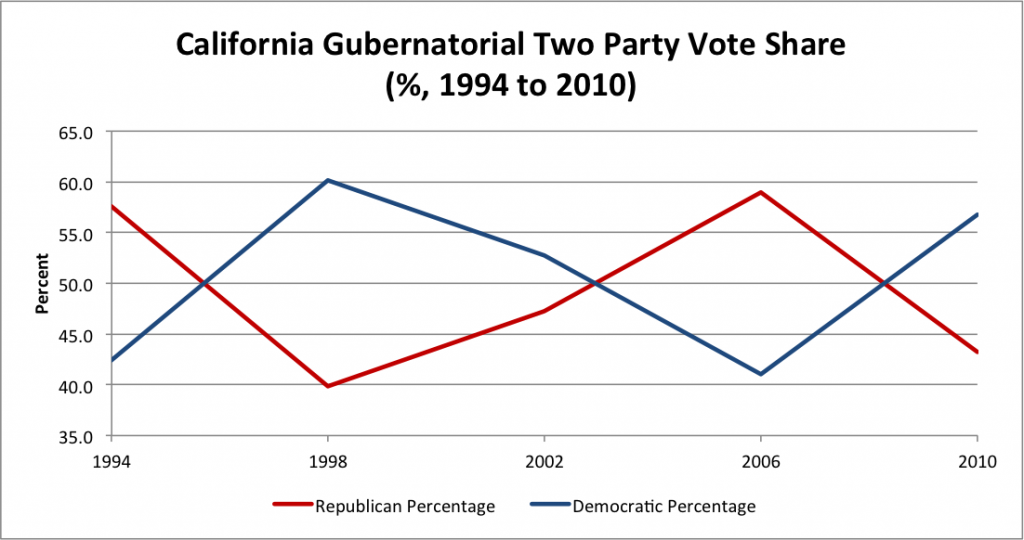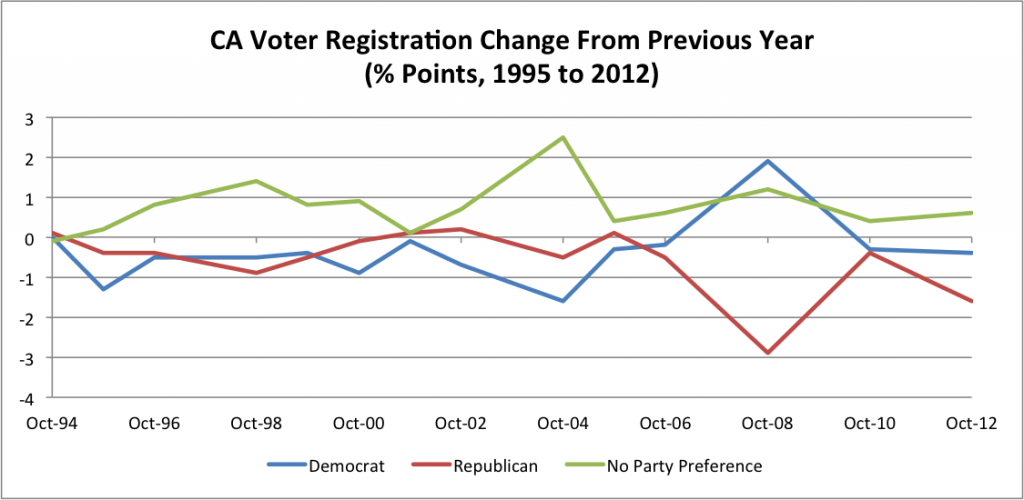Two years ago, California stuck out like a sore blue thumb on America’s political landscape.
At the same time the nation was veering right – Republicans winning historically at both the federal and state levels – Californians paddled furiously to the left: Jerry Brown was returned a governor’s office he had occupied nearly three decades previously; Democrats won each and every of the eight statewide constitutional offices – only one of those contests being competitive (Republican Steve Cooley lost the state attorney general’s race by 0.8%; every other GOP candidate sustained a double-digit defeat).
As for last month’s results, it was more of the same – business as usual being bad news for a California Republican Party that’s in the business of trying to win elections.
To wit:
- President Obama carried the state without working up a sweat – further evidence that the Golden State is no longer red in a world minus the red menace. California has gone in the Democratic column in each presidential election since the Berlin Wall fell, versus 9 Republican wins – and only 2 losses, in 1948 and 1964 – in the 11 elections during the Cold War-era presidential votes (1948-1988).
- Dianne Feinstein won a U.S. Senate race for the fifth straight time, in the process collecting a record number of votes. Her opponent: Elizabeth Emken, whose previous campaign experience was managing to finish last in a four-candidate Republican congressional primary two years prior.
- Once all the votes were tallied, California Democrats emerged with two-thirds “supermajority” control in each of California’s legislative chambers, meaning they can sign off on state constitutional amendments and tax increases without need of a single Republican vote. That, in addition to Republicans getting evicted from the budget process – no two-thirds majority required – courtesy of 2010’s Proposition 25.
- Looking forward to 2014, there’s the question of finding an able-bodied Republican to challenge Gov. Brown, assuming he seeks re-election (he turns 75 in April). The only GOP hopeful to emerge to date: Assemblyman Tim Donnelly, whose candidacy has been likened to a suicide mission. Whoever gets the nomination, he or she will be on the wrong side of a political escalator: California has reached an all-time high of 18.2 million registered voters; the number of registered Republicans stands at 29.4%, down a full 2% from four years ago.
- Make that a search for able-bodied Republicans, plural. After winning 5 of 8 statewide constitutional offices in 1994, Republicans have won only 3 of 32 such contests in the past four election cycles (1998-2010). Adding insult to injury: only 5 of those 20 losses would be deemed “competitive” (the margin of defeat being 4.1% or less).
- And, in image-conscious California, there’s the ongoing question of a toxic brand. As explained in the analysis that coincides with this introduction, the same party that spawned Richard Nixon and Ronald Reagan is on a fast-track to being supplanted by independent voters in the next decade, as it struggles to make inroads with youth and minority voters and battles a stereotype of being non-mainstream.
There are two ways to look at the Republicans’ California woes.
- No reason for alarm, with the Golden State reflecting a phenomenon that Hoover media fellow Michael Barone describes as “one-party government”. In the aftermath of the 2012 election, America now has 25 states where the governorships and legislatures are Republican-controlled, versus 15 states in Democratic lockstep. California and Texas are the ends of these extremes – if you don’t like your current government, pack up the car and drive east or west on I-10.
- Every reason for alarm, with California a symptom of a larger Republican disease that haunted the GOP in its failed efforts to unseat Barack Obama and win control of the U.S. Senate: the search for winning ideas and compelling messengers. A generation ago, California led the way on taxation (1978’s Proposition 13, a precursor to Reagan’s presidential run two year later) and was a cutting-edge laboratory for state innovation (welfare and criminal justice reform, a balanced approach to environmental regulation). Of central concern to California Republicans moving forward: assuming the party develops an agenda, who does the talking? The national party has a deep bench of talent; the state party doesn’t.
In this installment of Eureka, we won’t offer an elixir for the California GOP’s woes. There are still plenty of dialogues to be had on these pages.
But we will begin with by addressing the topic from several wide angles. That includes:
- Carson Bruno, a Hoover Institution research analyst, examining a California electoral environment that’s grown hostile toward Republican candidates;
- Charles Bell, the state GOP’s general counsel, taking on the critics and making the case for what his party is doing right;
- Duf Sundheim a former GOP state chair, discussing the party’s need to broaden the base – especially with younger voters;
- Rep. Devin Nunes, a five-term Republican congressman from the San Joaquin Valley, outlining how the party can better compete for Hispanic votes.
We hope you enjoy these columns – and a topic that’s central to the future of politics in the Golden State.









